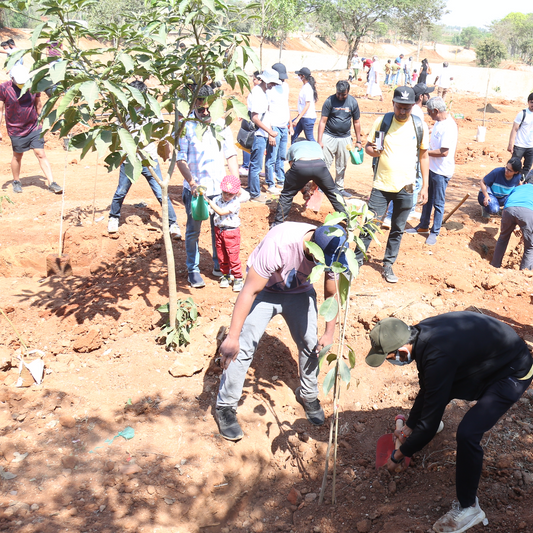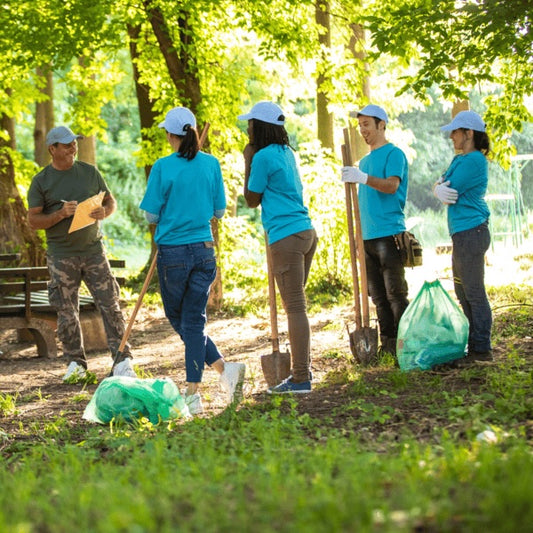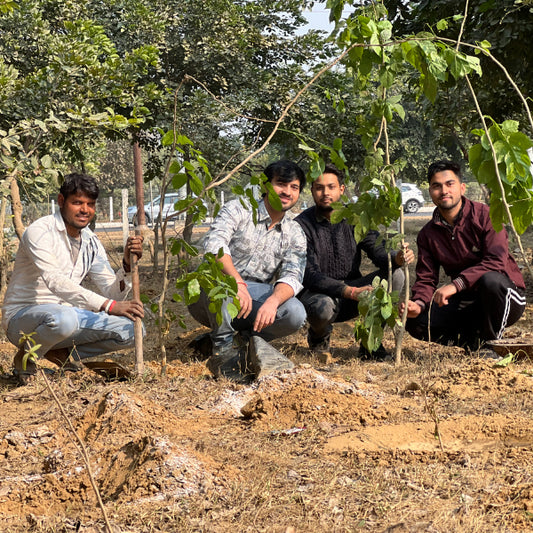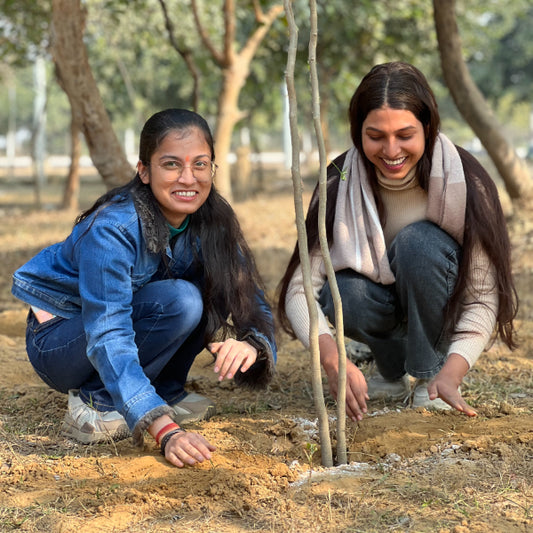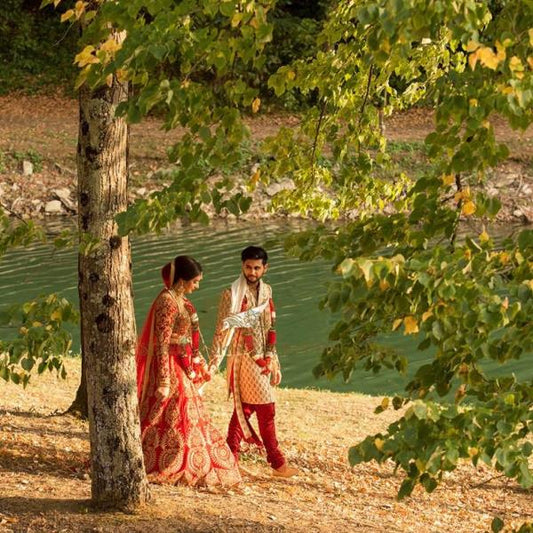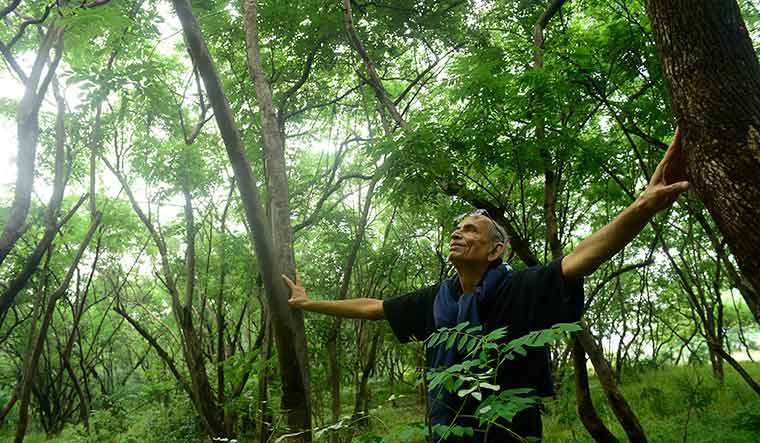

🌱 In the pursuit of environmental sustainability, few names shine as brightly as Madhav Gadgil. A pioneering ecologist, researcher, and policy advocate, he has played a crucial role in shaping conservation strategies in India. His work emphasizes the Read more
Trending
Trees for Corporates
Madhav Gadgil: Pioneering Eco-Conservation and Championing Sustainable
🌱 In the pursuit of environmental sustainability, few names shine as brightly as Madhav Gadgil. A pioneering ecologist, researcher, and policy advocate, he has played a crucial role in shaping conservation strategies in India.
His work emphasizes the harmonious coexistence of humans and nature, ensuring that development does not come at the cost of ecological destruction. 🌿
From leading groundbreaking studies on biodiversity to advocating for eco-sensitive policies, Madhav Gadgil’s legacy serves as a blueprint for sustainable environmental solutions. His contributions have directly influenced afforestation campaigns, ecological restoration, and community-driven conservation models. 🌍
Let’s explore how his vision continues to inspire reforestation, biodiversity conservation, and sustainable green initiatives worldwide. 🌳
Who is Madhav Gadgil? A Visionary in Environmental Conservation
Madhav Gadgil is one of India’s most respected ecologists and environmental thinkers. As the lead author of the Western Ghats Ecology Expert Panel Report, he provided an in-depth assessment of India’s fragile ecosystems and the urgent need for their protection. 🌎
His work extends beyond research, focusing on action-driven conservation that includes:
- Restoring degraded ecosystems through afforestation and biodiversity revival.
- Promoting eco-sensitive development that balances economic growth with environmental responsibility.
- Encouraging community participation in conservation efforts.
- Advocating for policies that protect India’s rich natural heritage. 🌾
By blending scientific research with grassroots involvement, Madhav Gadgil’s approach ensures that conservation is not just a top-down directive but an inclusive movement. 🍃
Why Trees Are the Backbone of Biodiversity Conservation
Trees play a critical role in maintaining ecological balance. They act as carbon sinks, improve air quality, and provide habitats for countless species. According to environmental studies, forests absorb 2.6 billion tons of CO₂ annually and host over 80% of terrestrial biodiversity. 🌲
Key Benefits of Trees in Conservation:
- Absorb greenhouse gases, reducing the impact of climate change.
- Prevent soil erosion and improve groundwater recharge.
- Create natural habitats for birds, insects, and mammals.
- Enhance local climate stability by providing shade and regulating temperature. 🌞
- Support traditional medicinal plants and sustainable agriculture. 🌿
Afforestation efforts inspired by Madhav Gadgil focus on planting native tree species to restore ecosystems naturally while supporting local communities. 🌍
The Western Ghats: A Biodiversity Hotspot Under Threat
The Western Ghats, often referred to as the "Sahyadri Hills," are one of the world's eight hottest hotspots of biodiversity. Home to over 7,400 species of flora and fauna, many of which are endemic, this mountain range is a natural treasure. 🌄
However, deforestation, mining, and urbanization continue to threaten this fragile ecosystem. Madhav Gadgil has been a strong advocate for the conservation of the Western Ghats, emphasizing:
- The creation of eco-sensitive zones to regulate development.
- The importance of community-driven conservation rather than relying solely on government intervention.
- Protecting traditional knowledge systems of indigenous communities for sustainable land use.
- Reforestation using native plant species to restore degraded landscapes. 🌿
His recommendations highlight the need for a holistic approach that considers both environmental protection and local livelihoods. 🌍
Choosing the Right Trees: Native Species for Maximum Impact
Reforestation is not just about planting trees—it’s about planting the right trees. Many large-scale afforestation projects fail because they introduce non-native species that disrupt local ecosystems. 🌳
Madhav Gadgil’s approach prioritizes native species that:
- Require minimal water and maintenance.
- Provide food and shelter for local wildlife.
- Enhance soil fertility and prevent erosion.
- Support pollinators, improving agricultural yields. 🐝
Some of the most ecologically beneficial native trees include:
- Neem Tree: Purifies air, has medicinal benefits, and improves soil health.
- Banyan Tree: Provides extensive shade and supports diverse bird populations.
- Jamun Tree: Produces edible fruits while improving soil stability.
- Mango Tree: A source of food and income for farmers practicing agroforestry.
- Tamarind Tree: Thrives in arid conditions and enhances biodiversity. 🌿
Planting these trees ensures long-term environmental and economic benefits. 🌎
Integrating Technology into Conservation
Modern environmental initiatives use cutting-edge technology to accelerate and monitor conservation efforts. Inspired by Madhav Gadgil’s work, many projects now incorporate: 🚀
- Drones for large-scale seed dispersal in inaccessible areas.
- AI-based monitoring to track tree survival and growth. 📊
- GIS mapping to identify degraded lands for targeted reforestation.
- Smart irrigation systems that conserve water while ensuring plant survival. 💧
These innovations make conservation efforts more effective and scalable. 🌱
Community Participation: The Key to Sustainable Reforestation
Madhav Gadgil strongly believed in a people-first approach to conservation. His recommendations emphasize that the best way to protect the environment is by involving local communities. 🌍
How communities contribute:
- Farmers integrate agroforestry into their land, improving crop yields and soil health.
- Women-led cooperatives manage tree nurseries, creating financial independence. 👩🌾
- Schoolchildren participate in tree-planting drives, fostering early environmental awareness.
- Local villages act as custodians of conservation areas, preventing deforestation.
By involving the people who rely on forests for their livelihoods, reforestation efforts become more sustainable and impactful. 🌳
How You Can Contribute to a Greener Future
Everyone has a role to play in creating a healthier planet. Here’s how you can make a difference: 🌿
- Plant a tree: Support afforestation initiatives by sponsoring a tree.
- Reduce waste: Adopt eco-friendly habits and minimize plastic use.
- Support sustainable farming: Buy from farmers who practice organic and agroforestry methods. 🌾
- Advocate for green policies: Encourage local leaders to prioritize conservation. 📢
- Volunteer: Join community-led reforestation programs and environmental groups.
Small actions add up to a big impact. 🌍
Final Thoughts: Building a Sustainable Tomorrow
Madhav Gadgil’s work reminds us that conservation is not just about protecting nature—it’s about ensuring a better future for all living beings. 🌱
By integrating scientific knowledge, community participation, and technological innovation, we can create a world where humans and nature thrive together. 🌍
The seeds of sustainability have been planted—now it’s time to make them grow. 🌿
You may also like
Corporate Plantations
Western Ghats and Madhav Gadgil’s Conservation Vision
The Western Ghats aren't just a tourist delight; they’re a biodiversity goldmine. Gadgil fought to protect these green lungs from reckless development, highlighting their role in climate regulation, water security, and species conservation. His advocacy stressed that preserving nature isn't anti-progress—it's just smart economics.
Gadgil Committee Report and Sustainable Development
When Gadgil spoke, policymakers had no choice but to listen (even if they didn’t like it). His committee report on the Western Ghats called for eco-sensitive zones, sustainable land use, and responsible growth. It ruffled feathers but remains a blueprint for balancing progress with preservation.
Biodiversity Conservation and Local Communities
Gadgil believed conservation isn’t just about saving trees—it’s about empowering the people who live among them. He championed community-led biodiversity protection, proving that locals aren’t threats to nature but its best guardians when given the right tools.
Eco-Sensitive Zones and Their Importance
Gadgil wasn’t a fan of turning every green space into a concrete jungle. His advocacy for eco-sensitive zones ensured that fragile ecosystems weren’t sacrificed for short-term development gains. His approach aimed to create a win-win for both nature and economic progress.
Sustainable Water Management and River Conservation
clean water shouldn’t be a privilege—it should be a fundamental right.
Climate Change and Its Impact on Biodiversity
Gadgil didn’t just study climate change—he predicted its consequences before it became a global panic button. He emphasized that warming temperatures, erratic weather, and habitat loss don’t just threaten humans but the entire web of life. His work called for urgent action before nature sends the final eviction notice.
Grassroots Environmental Activism and Public Participation
Gadgil wasn’t a fan of top-down policies. He believed in grassroots activism, citizen science, and involving local communities in decision-making. His approach proved that real environmental change doesn’t start in conference halls—it begins on the ground, with people who care.
Deforestation and Its Long-Term Consequences
Cutting down forests for quick profits? Gadgil saw it as an ecological time bomb. He warned that deforestation leads to landslides, erratic monsoons, biodiversity loss, and even economic collapse. His advocacy stressed that trees aren’t obstacles to development—they’re the foundation of a stable future.
Urbanization and Environmental Sustainability
cities should work with nature, not against it.
Traditional Knowledge and Sustainable Practices
Gadgil knew that ancient wisdom often holds modern solutions. He promoted traditional ecological knowledge—be it organic farming, water conservation, or forest management—proving that sustainability isn’t just about technology, but also about respecting what already works.
Mining, Industrialization, and Ecological Balance
Gadgil didn’t oppose industry—he just wanted it to be responsible. He exposed how unregulated mining and industrial expansion wreak havoc on ecosystems, displacing communities and depleting resources. His stance? Progress is great, but not when it comes at the cost of a livable planet.
Eco-Friendly Policies and Government Accountability
Gadgil wasn’t one to sugarcoat things—he called out governments for weak environmental policies and pushed for stronger regulations. He believed that sustainability isn’t just a buzzword; it’s a commitment that requires political will, corporate responsibility, and public participation.
FAQ
Who is Madhav Gadgil?
A trailblazing ecologist, Madhav Gadgil is best known for his work on biodiversity conservation, sustainable development, and environmental policies. He led the Gadgil Committee, which proposed eco-sensitive zones to protect the Western Ghats. His work emphasizes that conservation and development can go hand in hand—if done wisely.
What is the Gadgil Committee Report?
It’s the environmental wake-up call India didn’t want but desperately needed. This 2011 report outlined eco-sensitive zones in the Western Ghats, warning against unregulated mining, deforestation, and urban sprawl. It ruffled political feathers but remains a gold standard for sustainable land-use planning.
Why did the Gadgil Report create controversy?
Because it told the truth! The report called for strict environmental regulations, which didn’t sit well with industries and politicians hungry for unchecked development. While some saw it as a roadmap for sustainability, others saw it as an obstacle to "progress."
How does Gadgil advocate for biodiversity conservation?
He doesn’t just write reports—he empowers local communities to become conservation champions. From protecting forests to documenting species, Gadgil believes real conservation happens when people, not just policymakers, are involved.
What role do eco-sensitive zones play in sustainability?
Think of them as nature’s VIP lounges—fragile ecosystems that need extra protection. Gadgil championed these zones to ensure forests, rivers, and wildlife aren’t bulldozed for short-term economic gains. A healthy planet equals a healthy economy, after all!
How does Madhav Gadgil view climate change?
Smarter policies, community-driven conservation, and a serious rethink of our reckless consumption habits.
Why is local community participation key in conservation?
Because no one understands the land better than the people who live on it! Gadgil advocates for community-led conservation, where locals protect forests, document biodiversity, and implement sustainable practices—turning them into the best environmental stewards.
How does Gadgil propose balancing development and conservation?
By ditching the “either-or” mindset! He believes in sustainable development that respects nature—think eco-friendly urban planning, responsible mining, and industries that don’t treat the planet like a disposable resource.
What are the long-term consequences of ignoring Gadgil’s warnings?
More floods, landslides, vanishing species, and water shortages—basically, an environmental nightmare. Gadgil’s research shows that reckless development leads to ecological collapse, proving that short-term profits often create long-term disasters.
What is Madhav Gadgil’s take on traditional knowledge?
He sees it as a goldmine of sustainability! From organic farming to water conservation, indigenous practices often hold solutions to modern ecological problems. Gadgil promotes integrating this wisdom with science for better environmental management.
How does Gadgil’s work influence government policies?
It gives policymakers a much-needed reality check. His reports and recommendations push for stricter environmental laws, better urban planning, and corporate accountability—though implementation often faces political resistance.
What’s the biggest lesson from Madhav Gadgil’s work?
That sustainability isn’t a luxury—it’s a necessity. Whether it’s conserving forests, managing water resources, or planning cities, Gadgil’s work proves that a greener approach isn’t anti-development; it’s the only way forward!
Most Popular
Connect with us
-
👥 Corporates
If you are looking for:
- 🌲 Tree Plantation Events
- 📊 CSR Projects
📧 corporate@growbilliontrees.com
📞 +91 9699723523
💬 +91 9370599291 WhatsApp (Only)
🕒 Mon - Sat | 10am - 7pm IST
-
🧩 Tree Plantation NGOs
If you are looking for:
- 💰 Financial Assistance
- 🤝 Operational Support
📧 support@growbilliontrees.com
📞 +91 9699723523
💬 +91 9370599291 WhatsApp (Only)
🕒 Mon - Sat | 10am - 7pm IST
-
🌼 Individuals
If you are looking for:
- 👥 Group Tree Plantation Drive
- 🌳 Bulk Tree Plantation
📞 +91 9699723523
💬 +91 9370599291 WhatsApp (Only)
🕒 Mon - Sat | 10am - 7pm IST






